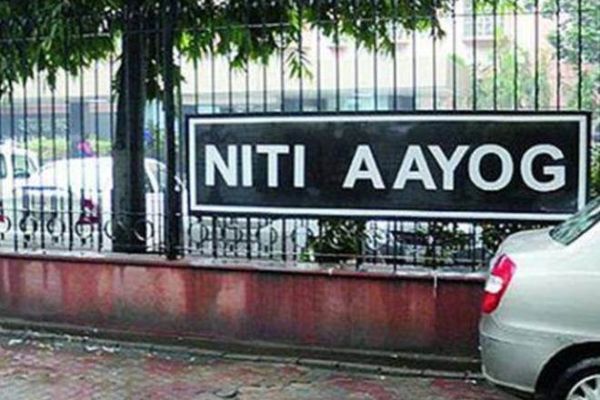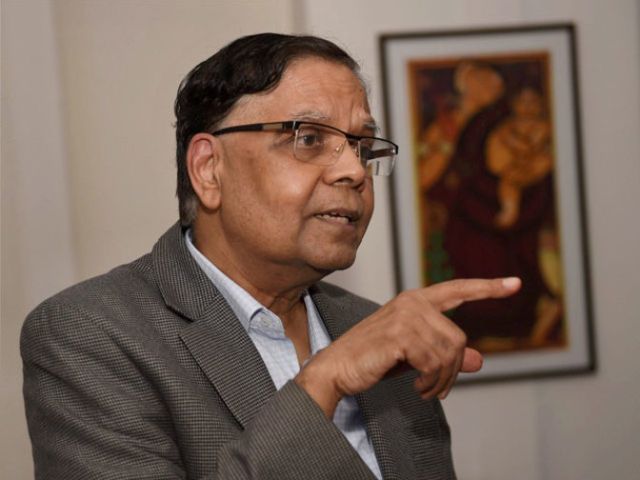
by admin | May 25, 2021 | News, Politics
 New Delhi : NITI Aayog Vice-Chairman Rajiv Kumar on Wednesday said that the law underlining Aadhaar will have to be strengthened in the wake of Supreme Court upholding the right to privacy as a fundamental right.
New Delhi : NITI Aayog Vice-Chairman Rajiv Kumar on Wednesday said that the law underlining Aadhaar will have to be strengthened in the wake of Supreme Court upholding the right to privacy as a fundamental right.
“Article 21 has been interpreted again. The law underlining Aadhaar will have to be strengthened,” he said here at the conclave on financial inclusion organised by United Nations in India.
The Supreme Court on August 24 had declared right to privacy as a fundamental right guaranteed by Constitution, a ruling that could have a bearing on the case related to Aadhaar that has been made mandatory in various services.
The right to privacy is protected as an intrinsic part of the right to life and personal liberty under Article 21, the court had said.
Aadhaar will thus have stand the test of constitutionality as the Supreme Court’s decision on the legislation still pending.
The government will have to prove that Aadhaar can restrain right to privacy on the grounds of dissemination of social benefits or national security.
Aadhaar (Targeted Delivery of Financial and other Subsidies, benefits and services) Act, 2016, which aims to provide legal backing to the Aadhaar unique identification number project, was passed in 2016 by the Parliament.
The NITI Aayog V-C said that at the core of the issue is mistrust in the minds of some relating to the protection and usage of Aadhaar data.
“We in the government need to work on it (removing mistrust) and try and do away with it to ensure we all are at the same page, in the same direction and for the same cause,” he said.
The government has said that it aims to achieve financial inclusion with the interplay of over a billion Aadhaar number, over a billion bank accounts and mobile phones (JAM trinity).
Digital push and financial inclusion is what India needs to be at the frontiers of technology, he added.
“The digital revolution is unfolding before us. It is up to us to use it the way we can. I do think financial inclusion is the key to achieve all,” Kumar said.
—IANS

by admin | May 25, 2021 | Business, Corporate, Corporate finance, Corporate Governance, Emerging Businesses, Large Enterprise

Arvind Panagariya
New Delhi : Enterprises in India take considerably less time in obtaining approvals than reported by the World Bank data, the NITI Aayog said on Tuesday.
According to the NITI Aayog’s “Ease of Doing Business” survey, which covered over 3,000 enterprises, the average time taken to set up a business in India was 118 days. For construction permits, it took even lesser time with an average of 112 days, the survey report said.
“In some states such as Madhya Pradesh and Bihar, getting a construction permit takes even fewer days,” the Aayog said in a statement.
However, according to the World Bank’s 2017 Doing Business report, the time taken for getting construction permits was 190 days, it said, adding: “Thus, it appears that the actual experience of enterprises is better than the survey results of the World Bank.”
“Similarly, on average, it took enterprises about half the time to resolve legal disputes as was reported in the World Bank Survey,” the NITI Aayog statement said.
While the World Bank Survey focuses on industry leaders from Delhi and Mumbai, the survey by the NITI Aayog covers firms, start-ups and experts from almost all states and union territories in India.
However, there is a wide variation across states with Madhya Pradesh and Bihar taking 41 and 43 days respectively to get construction permits, while Assam took 270 days.
“The survey indicates that the government’s efforts to improve business environment are showing results on the ground,” the NITI Aayog said.
It added that the experiences of start-ups started since 2014 suggested a significant improvement in doing business.
“Newer and younger firms take less time in obtaining approvals, highlighting a favourable business environment. Young firms report that most regulatory processes do not constitute a major obstacle to their doing business,” it said.
It added that enterprises in high-growth states are significantly less likely to report major or very severe obstacles in land and construction related approvals, environmental approvals and water and sanitation availability as compared to enterprises located in low-growth states.
“Enterprises in high-growth states also report taking less time on average for nearly all aspects of doing business,” it said.
The NITI Aayog survey, conducted between April 2015 and April 2016, only takes inputs from firms in the formal manufacturing sector. It does not cover unorganized manufacturing and the services sectors that constitute the vast majority in India.
While the World Bank Survey covers 10 parameters handled by the states and the central government, this survey primarily deals with issues handled by the state governments.
—IANS

by admin | May 25, 2021 | Business, Economy, Large Enterprise, News, Politics
 New Delhi : Enhancing access to low-cost capital to businesses could serve as an important vehicle for improving the business environment, especially in poor states like Bihar, the NITI Aayog has recommended.
New Delhi : Enhancing access to low-cost capital to businesses could serve as an important vehicle for improving the business environment, especially in poor states like Bihar, the NITI Aayog has recommended.
In its report on “Ease of Doing Business”, the premier policy think-tank says that half the enterprises do not borrow from financial institutions and about a third consider lack of access to finance as a major obstacle for business in the country.
The survey covers over 3,000 enterprises across India and makes an effort to assess ease of doing business from their perspective as opposed to the perspective of policy makers.
“There is a large variation in the experiences of enterprises in different states regarding the access to finance. This suggests that enhancing the access to low-cost capital to businesses could be an important vehicle to improve business environment, especially in poorer states such as Bihar,” said the report.
It added that there is a robust correlation between a favourable business regulatory environment and greater economic activity with faster growing states having more conducive business environment than slow growing states.
“These results should provide the impetus to press ahead with the economic reforms agenda,” it said.
The survey also found out a strong association between greater ease of doing business and higher rates of growth.
“We found that fast-growing states systematically exhibited fewer delays in the grant of permits and clearances in various areas as also greater flexibility in the implementation of labour and environmental laws.”
“While our analysis does not establish a causal relationship flowing from greater ease of doing business to faster growth, it does strongly suggest that growth and ease of doing business form a virtuous cycle such that one reinforces the other,” the report said.
—IANS

by admin | May 25, 2021 | Corporate, Corporate Governance
 New Delhi : The NITI Aayog on Monday recommend reforming labour laws and a greater flexibility in their implementation to enhance ease of doing business.
New Delhi : The NITI Aayog on Monday recommend reforming labour laws and a greater flexibility in their implementation to enhance ease of doing business.
In its “Ease of Doing Business” survey report, released by Law Minister Ravi Shankar Prasad and Industry and Commerce Minister Nirmala Sitharaman, the planning body said that firms in labour intensive sectors find compliance with labour-related regulations “particularly onerous”.
“This fact translates into enterprises avoiding labour-intensive sectors,” it said adding that a large number of firms covered in the survey reported that finding skilled workers, hiring contract labour and firing employees was a major obstacle.
“The fact that enterprises in labour-intensive sectors experience greater difficulty than those in capital-intensive sectors points to the need for further reform in this area,” said the report.
“In addition, more flexible labour laws will also allow enterprises to grow larger and reap economies of scale, generating productivity improvements, job creation and higher growth,” it said.
The survey covers more than 3,000 enterprises across India and makes an effort to assess ease of doing business from their perspective as opposed to the perspective of policy makers.
—IANS

by admin | May 25, 2021 | Business, Business Ideas, Corporate, Corporate Governance, Entrepreneurship, SMEs, Startup Basics
 New Delhi : The Niti Aayog on Wednesday invited applications for its “Mentor India” campaign aimed at engaging industry leaders to mentor students in various schools across the nation.
New Delhi : The Niti Aayog on Wednesday invited applications for its “Mentor India” campaign aimed at engaging industry leaders to mentor students in various schools across the nation.
Envisaged to be the largest formal volunteer mentor network, the campaign is aimed at maximising the impact of Atal Tinkering Labs, a statement from the Niti Aayog said.
Under the campaign, the government’s premier think-tank is looking for corporates, professionals, academicians and students “who are keen to contribute to this strategic nation building initiative”, it said.
The deadline for submission of applications to join Mentor India is September 30.
The mentors would guide students at more than 900 Atal Tinkering Labs set up across the country as a part of the Atal Innovation Mission (AIM).
Atal Tinkering Labs are dedicated work spaces — equipped with state-of-the-art equipment such as 3D printers, robotics and electronics development tools — where students from Class 6 to Class 12 can learn innovation skills and develop ideas.
“Mentor India has already received strong support from corporate India. More than 30 of India’s top thought leaders have signed up as brand ambassadors for the initiative,” the Niti Aayog said.
“More than 90 Atal Tinkering Labs in schools across India have been adopted and are being supported by various corporations and institutions from multiple sectors,” it said, adding that it was looking to engage with more institutions to adopt these labs and enable their employees to join Mentor India as volunteers.
“Possible areas of contribution from mentors include technical knowhow, innovation and design, inspirational, and business and entrepreneurship,” it said.
Under the programme, the mentors are expected to spend one to two hours every week in one or more such labs and discuss with students the various problems our society is facing and motivate them to develop solutions to these community problems, the statement said.
—IANS

 New Delhi : NITI Aayog Vice-Chairman Rajiv Kumar on Wednesday said that the law underlining Aadhaar will have to be strengthened in the wake of Supreme Court upholding the right to privacy as a fundamental right.
New Delhi : NITI Aayog Vice-Chairman Rajiv Kumar on Wednesday said that the law underlining Aadhaar will have to be strengthened in the wake of Supreme Court upholding the right to privacy as a fundamental right.

